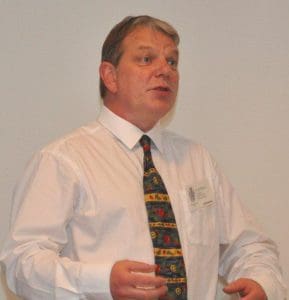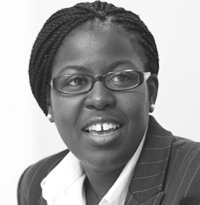
From left: Beatrice Njindou, Toufak Ahangari, Kevin Korgba, Rollo Greenfield, Steve Cameron, Geoffrey de Mowbray, Grace Asemota, Donna Marsh, Andy Gibson.
Efforts are under way to ease Africa supply chain frustrations, Institute of Export London meeting on Exporting to African Markets hears, By James Brewer
African countries are striving to vanquish the logjams that bedevil inland transport, and to clean up and expedite port procedures, an event organised by London branch of the Institute of Export and International Trade heard.
The packed meeting, with the theme Exporting to African Markets: Risk and Return, addressed among itsmain topics the lack of efficiency in much of Africa in moving goods to interior consumer markets, and the plague of illegal practices at the ports. This was said to be hampering severely trade between neighbouring countries.

A section of the audience, including, temporarily, Toufak Ahangari and Andy Gibson in front row
Steve Cameron, vice-chairman of the Business Council for Africa, marine director at RTI Forensics and a consultant on African trade, said that while international shipping companies served the major ports to a high standard, the supply chain “fell down” in hinterland services. “You need local agents who can make the right choices for you, ” Mr Cameron told the June 25 2014 meeting.
Mr Cameron, who started as a merchant navy officer and got into African business development 20 years ago, said that it was a lot cheaper to move consignments by sea than by road. It was the maritime connections that plugged trade into the global market.

Panellists Rollo Greenfield, Steve Cameron, Geoffrey de Mowbray, Grace Asemota, Kevin Korgba and Donna Marsh.
Historically land transport in some countries was so slow, with checkpoints and bribes along the way, that costs could increase by thousands of dollars. “You need more time and patience than you think, ” he said.
Mr Cameron saw the situation in the ports themselves as more attractive. “A lot of ports have been concessioned. Where there is a private operator, your ship will get turned round on time, ” he said.”You will get across the terminal on time, but you have to deal with the other authorities. Quay charges and demurrage can escalate quickly to become a very high percentage of the costs. If you are looking at sea freight, often it will be driven by the terminal. So I suggest you calculate the quay charges and consignee charges before deciding which carrier to use.”

Andy Gibson
Nigeria in particular should be a huge draw for trade, said Mr Cameron, “but people know how difficult it is.”
Putting on the screen a map of trade routes based on volume, Mr Cameron said that a lot of the ports in West and East Africa hardly showed because Africa only has 3% of world trade. There was now a race to develop huge ports – where are they going to be? Dakar, Abidjan, Tema and Lagos are pressing forward. He described Tema in Ghana as “a good place for business and people feel it is a big stepping stone into the rest of Africa.”
Mr Cameron advised European enterprises to pay particular attention to Tanger Med port. The Moroccan facility – Tanger Med 1 was completed in 2007, with capacity of 3m teu a year – was only a short distance from the southern European market. By 2015, including Tanger Med 2, the complex aimed to handle a total of 8m containers, 7m passengers, 700, 000 trucks, 2m other vehicles and 10m tonnes of oil products.
He said that Africa, with an area of 30m sq km was the size of the US, India, Argentina, Western Europe and China together. The continent had 15% of the global population, a much higher percentage than it had of world trade. Africa generated only the same quantity of electricity as Spain, and that added to the costs and difficulty of doing business.

Steve Cameron
Cynics had described Africa 10 years ago as a basket case, but there were now several “hot areas” for growth, including Ethiopia, which should be on the radar screen, said Mr Cameron.
He advised firms with an interest in the market: “Spend time getting to know the person you are doing business with.” Even after signing a contract, sit down with the agreement and you might find that your counter-party has a different view of it to yourself.
Andy Gibson, who chaired the meeting, agreed with Mr Cameron on the question of logistics, saying: “It is about local knowledge.” In some countries, for example landlocked Burkina Faso, “you have no choice but to use trucks.”
Mr Gibson, an international trade and engineering specialist and board member of the Institute of Export, asked rhetorically, “what about getting from Port Harcourt to Abuja, ” a nine-hour road journey, “in one bit?” (robberies and illegal police checkpoints are among the hazards).
Kevin Korgba, managing director of Enterprise, Training & Knowledge (ETK) Group, referred to the Customs modernisation programme launched in Nigeria in 2009. The Nigeria Customs Service has promised massive progress in the next few years in advanced international practices including “single window” (allowing clients to deal with just one agency), concentrating border functions in a single organisation, intelligence-driven risk management focusing on cargoes and firms most likely to be non-compliant, and the authorised economic operator regime that minimises interventions against trustworthy entities.

Grace Asemota
Customs leaders have further moved to stamp out illegal payments, after several foreign firms were accused of involvement in malpractice. Mr Korgba said: “In Customs, the government is putting in regulations that are supposed to deal with a lot of difficulties and getting things cleared from the ports. A pre-arrival assessment report is supposed to reduce the time to clear your goods from six days on average to six hours. And the only body in the ports to deal with the goods is Nigeria Customs, whereas in the past you had to deal with about 10 agencies.”
Mr Korgba said: “What they have done with the Customs regulations is a start. But the road infrastructure and issues with the police are a continuing concern. The political will from the government to try to sort out these issues is ongoing. It will take some time but I think the will is there. The demand from Nigerians themselves for these issues to be tackled is becoming greater.”
He said that there was no point in bringing goods from foreign markets in five or six days of sailing time, “and then it takes you another 20 days [to get to inland destinations] because the trucks are breaking down.”
Geoffrey de Mowbray, chief executive of Dints International, a supply chain provider which works with the mining and heavy equipment industries, saw signs of progress. He said: “Logistics remains a challenge, but it has improved somewhat. The key is aggregation: there are a lot of players, each with its own strength. Things are changing. The roads are better than they have been, but patience is key.”

Beatrice Njindou
Mr de Mowbray grew up in West Africa in an expat family and could not help notice the lack of new solutions going into Africa, and how business benefited a small minority only of the population. “It is very much our objective to drive change and act as a tool of development, ” he said.
When he started in business, there had been almost no interest in financing the kinds of deal with which he was familiar. “Now there is a lot more. Typically it has been a very greed-based environment, and we are not that type of company. We treat people with respect and fairness.”
It was a tricky market in which to operate, and “we work with some fantastic credit insurers. That provides huge amounts of comfort and has enabled us to access finance we would not otherwise be able to.” Dints had never used a bank for financing, preferring “private investors we know and crowd funding methods. It is very similar to the ways in which communities in Africa operate. Crowd funding is an amazing way to involve communities in business.”
Mr de Mowbray admitted: “We have had our fingers burned as well. There are risks – that happens in Europe too. It is really [a question of] taking what there is around and using it to mitigate that risk.”
On the matter of culture, he said: “The diversity is immense. Never underestimate the cultural element and how important it is to have local partners.”
Kevin Korgba, who started his first business in Nigeria at the age of 20, described the massive potential of that country. With its population estimated between 168m and 172m – Lagos is effectively a country on its own with more than 20m people – it could not be ignored. A large part of the population was said to be living on $2 a day, but “almost everybody” has a mobile phone. In the early stages of acquiring phones, a SIM card cost about £100. In 10 years, MTN, the leading provider in the country had more than 53m subscribers. He cautioned, though: “Nigeria is clearly a high risk market any which way you look at it.”
The Nigerian government had actively started recruiting technocrats, and was trying “ to move aside clueless politicians in key areas.” The terrorism in the northeast of the country meant that effectively the north was performing very little in the Nigerian economy, and there were power supply issues.
On the other hand, the population was young, and Nigeria was a very consumer-centric country: “you just have to ask the Chinese about the amount of imports that go into Nigeria.” Parts of the country now had 4G high speed wireless internet access, “and because of the advent of mobile phones people are a lot more clued up, they want high quality goods. Educated people have travelled to the UK and US, and know what is of high quality and what is not.”
Mr Korgba said that although regulatory frameworks were improving, “there is a lot of work to be done particularly in dealing with corruption. The question to ask yourself is, are you actually brave enough to export to Nigeria?”
Rollo Greenfield, chief executive of the UK operations of Diamond Bank, spoke of the “trust dynamics” and emphasised that trade is all about the extent to which you trust people. He extolled the mechanism of the letter of credit, which “has been around for years – and it works.” A bank in London will pay the exporter on the strength of the right documents.
As to unconfirmed letters of credit, the banks normally pay the seller only when they are paid by the importer’s bank. Mr Greenfield warned that some payment methods might be vulnerable to countries running out of foreign exchange. The currency of most African countries was not fully convertible.
Economic growth in sub-Saharan Africa was expected to be about 6% this year, and Mr Greenfield cited statistics that showed exports and imports in the last 10 years have basically doubled. “So these are economies that are growing fast and there is no sign of that stopping at the moment.”
Mr Greenfield spoke of the daunting energy requirements. “If smaller companies cannot get energy cheaply, they are going to struggle to make money. If we sort out the energy issues, the economies and going to explode [in growth terms], ” he said.
Referring to corruption and other drawbacks to trade, he said: “I think things are changing… definitely in Nigeria, ” but it was hard to shake off a reputation for wrong-doing.
“African countries exhibit enormous potential and massive energy – we have felt that today, ” concluded Mr Greenfield, appearing to refer both to the speakers and lively participation from the audience.
Grace Asemota, legal director at Clyde & Co, advised businesses to invest time in ensuring good documentation and in deciding the dispute resolution system that should be used.
She joined other speakers in referring to delay as one of the biggest problems in importing goods. Customers would settle on a fob basis so they did not get involved with goods getting to the destination. Ms Asemota warned of the risk of demurrage disputes, in which there could be a vessel sitting in port for months on end.
Tema and Lagos were among ports seeking to train people to facilitate the passage of goods. “Local agents are beginning to know what they are doing, and realise that providing a good service is a key selling point. Kenya is another example where it is inspection at the destination, and you have that familiarity.”
She said: “The logistics is challenging and it does put a lot of cost on to moving goods, but on the legal, regulatory side, governments have come together to try to simplify matters.”
Ms Asemota reminded her listeners that they needed to ensure they were up to speed with the provisions of the Bribery Act 2010 passed by the UK, and that they carried out due diligence on their counter-parties. They needed a clear training policy and a risk assessment process. As a UK entity, it is not an excuse that “it happened somewhere else, ” because of the long extra-territorial reach of the Bribery Act, under which penalties are up to 10 years in prison and unlimited fines. Joint venture partners “on the ground” must understand the significance of that.
Donna Marsh, a consultant with Farnham Castle Intercultural Training, urged people to “spend time, not just on the transaction, not just on the money, but on building relationships, building trust and avoiding causing anyone to feel they have lost face, or feel embarrassed or ashamed.” She called on people who looked on trade with Africa from a Western point of view, to realise that China and South Korea had a lot of impact on what is going on in the continent.
Mr Gibson praised the panel of speakers “who really do know their stuff.” The event, at the Arab British Chamber of Commerce in Upper Grosvenor Street, London W1, was organised by Mr Gibson and Beatrice Njindou, marketing officer of the London branch of the Institute of Export. Media partner was www.allaboutshipping.co.uk.
A warm welcome to all present was extended by Toufak Ahangari on behalf of the London branch, which she chairs.





